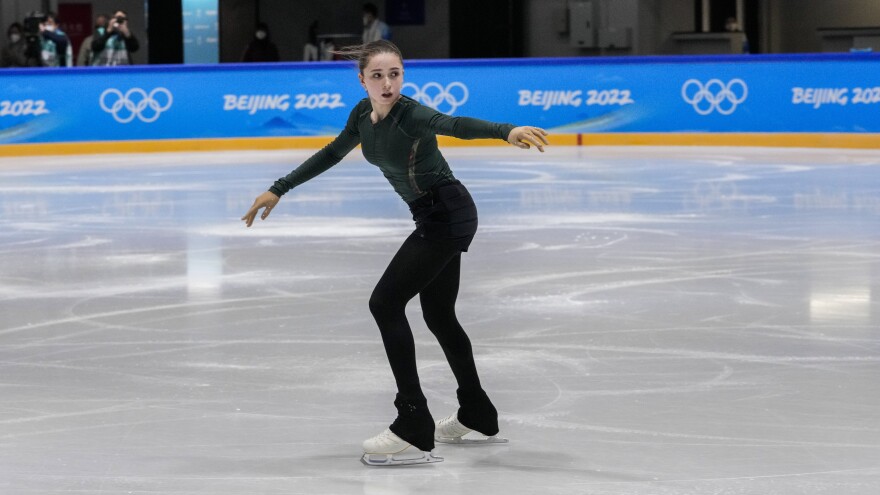BEIJING — Yet again, the Olympic Games have been touched by the specter of doping. This week, it came to light that 15-year-old Russian star figure skater Kamila Valieva tested positive for a banned drug. The test result came from a sample Valieva gave Dec. 25. But it wasn't revealed until this week, the day after Valieva helped her Russian Olympic Committee team win a gold medal in the Olympic figure skating team event.
After the revelation, Valieva was suspended from competition, but then the Russian Anti-Doping Agency reversed the suspension. That decision is being appealed in front of the Court of Arbitration for Sport, which will meet on Sunday and reveal its ruling on Monday. The women's figure skating individual event at the Beijing Games begins Tuesday — Valieva is the gold medal favorite.
I met with former Olympic figure skater Adam Rippon on Friday. We'd previously scheduled an interview for a skating story I was working on.
Rippon won a bronze medal in the team event at the 2018 Winter Games in South Korea. He's at these Olympics to help coach Mariah Bell, who won the women's individual event at the U.S. Figure Skating Championships last month.
We discussed a wide range of topics, but talk about the scandal was unavoidable, as the news swirled around the skating world gathered in Beijing.
Tom Goldman: On Monday, Kamila Valieva became the first female skater to land a quad (quadruple-rotation jump) in Olympic competition. Her positive drug test may mean her team loses the gold medal. But beyond the possible reshuffling of the final standings, what does this all mean for her performance?
Former Olympic figure skater Adam Rippon: The saddest part [about the doping scandal] is that as a sport, and people who are fans of the Olympics, we want to celebrate that. That's amazing. The way that Kamila Valieva was able to skate in that team competition is amazing. Every program she did, I was one of the first people to stand up because I was in awe of what I was seeing. And, they ruined that. They ruined that for her, and they ruined it for all of us who really were so excited that there was this incredible talent.
Who is they?
The adults around her. Valieva is 15. I doubt very much she knowingly doped. She's a minor. The adults completely failed her.
[The successful coach Eteri Tutberidze is the adult most directly significant to Valieva's career. There are no public allegations, or evidence, that Tutberidze had anything to do with Valieva's positive drug test. But reports say Valieva and her quad-landing teammates Alexandra Trusova and Anna Shcherbakova — who are also medal favorites in Beijing — are the latest in a string of teenage champions coming out of Tutberidze's camp. Champions who essentially peak in their teens and then retire, often because of injury and after experiencing questionable practices regarding diet restrictions and over-training.]
Valieva, Trusova and Shcherbakova are expected to dominate the women's individual competition in Beijing. Now that one of them has run afoul of international drug testers, how does this change the feel of the upcoming event?
It puts a cloud over the entire event. A cloud. Nobody will ever think of this event and not think of the doping scandal that was attached to it. That sucks.
If CAS — the Court of Arbitration for Sport — rules against Valieva, and she's banned from the rest of the Games, would that lift the cloud?
No. No it wouldn't. It questions everything. You know, [Valieva] is one of three skaters from the same camp. No positive tests [for the others]. But I mean it questions absolutely everything. So, nobody will look at the event with rose-colored glasses.
[Valieva, Trusova and Shcherbakova have separated themselves in women's individual figure skating with their quad jumps. The drug found in Valieva's system, trimetazidine, is said to help with endurance, which could help a skater stay strong and succeed on difficult jumps during a long program. That said, there's no consensus on whether the drug effectively enhances performance.]
If there IS a connection between the substance and the Russian teenager's successful jumping, does this incident interrupt the natural evolution of quad jumping in women's figure skating, which has lagged behind the men's sport?
No. I think because just being able to see a female do the quadruple jump has inspired a lot of women to start working on it. Urgently. And I think all across the world there are girls who now go, "OK, when I grow up, I want to be able to do a triple axel and a quadruple jump." And I think that because they don't put a ceiling on what they think is possible, anything is possible.
Copyright 2022 NPR. To see more, visit https://www.npr.org.




